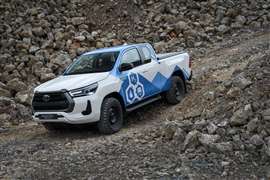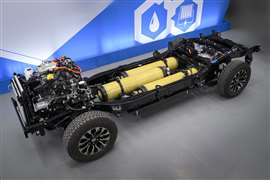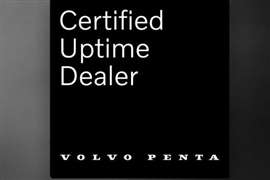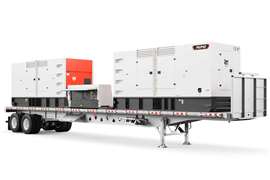Read this article in Français Deutsch Italiano Português Español
Toyota Hilux FCEVs enter ‘demonstration phase’
07 June 2024
 Ten units of the Hilux FCEV are now in testing (Photo: Toyota)
Ten units of the Hilux FCEV are now in testing (Photo: Toyota)
Toyota Motor Corporation has revealed that its hydrogen fuel cell electric vehicle (FCEV) Hilux pickup has now reached the ‘demonstration phase’.
This period is set to include evaluation and demonstrations of the FCEV concept, This will involve 10 vehicles produced by Toyota Motor Manufacturing UK in Burnaston, Derbyshire. TMMUK has taken the lead in the project, with support from Toyota Motor Europe (TME). Five units are undergoing durability tests, while five others are now on customer and media tours.
The FCEV Hilux uses a second-generation fuel cell system which has already featured in the latest Mirai FCEV passenger car. This application uses a polymer electrolyte fuel cell stack with 330 cells. A permanent magnet synchronous motor takes power from a li-ion battery pack and can deliver up to 180 bhp (134 kW) and 300 Nm of torque to the rear axle.
The Hilux FCEV is said to deliver higher payload and towing capacities than models using other zero-emission alternatives. With three onboard fuel tanks, holding a total of 7.8 kg of H2, the vehicle is expected to have a range of up to 600 km (372 miles). The battery pack is positioned above the tanks under the truck bed.
 Chassis of the Hilux FCEV (Photo: Toyota)
Chassis of the Hilux FCEV (Photo: Toyota)
Development of the Hilux FCEV is supported by a series of partners, including Ricardo (component integration), European Thermodynamics (thermal management systems), and D2H (thermodynamic modelling). Fuel cells are produced at the TME R&D centre in Belgium.
Moving forward, Toyota is planning a limited production run of the FCEV Hilux. While no dates have been confirmed, SOP could be before the end of 2024.
In addition to the FCEV Hilux, Toyota has confirmed development of a new hybrid electric version of the Hilux. This will use a 2.8-litre engine to charge a 48 V electrical system using a 7.6 kg battery pack located beneath the rear seats. The system will also power the 12 V system via a DC/DC converter.
The electric motor/generator can produce up to 12 kW of power and 65 Nm of torque. This can either be used in tandem with the engine, or provide supplemental power to reduce engine load.
In other news, Toyota Motor, together with partner companies Mazda and Subaru, has presented new internal combustion engine prototypes which can use hydrogen, petrol or other alternative fuels. Engines on show included 1.5- and 2.5-litre models which are shorter, smaller and more powerful than existing versions.
The super-low emission engines are intended to support development of next-gen hybrid powertrains. While Toyota has now produced its first fully-electric models, the company is enjoying a resurgence in hybrid vehicle sales around the world.
No timeframe was given for the introduction of these engines, although Hiroki Nakajima, chief technology officer at Toyota, said at the unveiling that they would be available before stricter emissions regulations come into effect.
Toyota also noted that the company is now conducting a study with petroleum company Idemitsu Kosan, heavy machinery OEM Mitsubishi Heavy Industries and oil refiner Eneos Holdings to develop carbon-neutral fuels. This are set to be available in Japan by 2030.
POWER SOURCING GUIDE
The trusted reference and buyer’s guide for 83 years
The original “desktop search engine,” guiding nearly 10,000 users in more than 90 countries it is the primary reference for specifications and details on all the components that go into engine systems.
Visit Now
STAY CONNECTED




Receive the information you need when you need it through our world-leading magazines, newsletters and daily briefings.
CONNECT WITH THE TEAM













